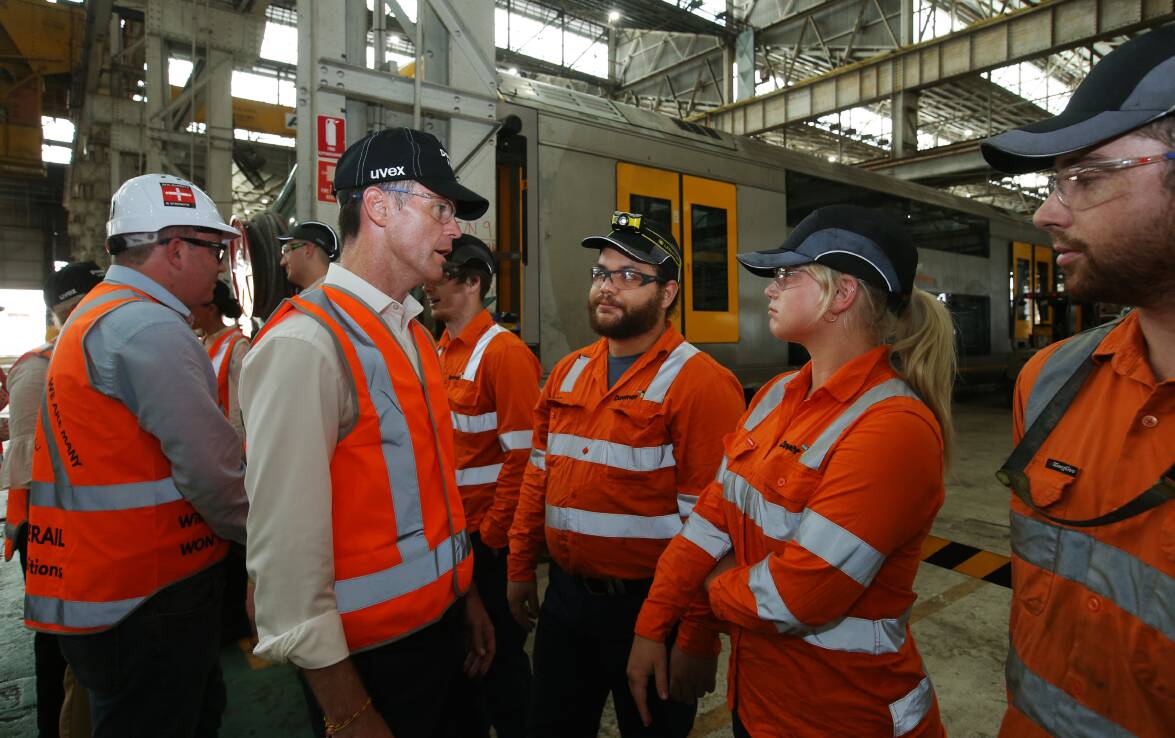
NSW Treasurer Daniel Mookhey says the Hunter will "play a crucial role" in reviving train manufacturing in the state when the government replaces the Tangara fleet.
Mr Mookhey's comments during an interview with the Newcastle Herald are the strongest indication yet that the Labor government will invest heavily in train manufacturing in the Hunter.
"Part of where the government's heading in terms of its procurement policies is to ensure we're building trains here again," he said.
"The Hunter is going to play a crucial role in the revival of train manufacturing in NSW, and we look forward to working with the Hunter community, particularly, as we make important decisions around how we renew the Tangara fleet.
"I think that's a principal investment the government is looking to make."
Then opposition leader Chris Minns said during a visit to Newcastle in February that Hunter firms would be "extremely competitive" when it came to replacing the Broadmeadow-built Tangara fleet.
Labor promised before the March election to replace the state's metropolitan trains with new rolling stock made in NSW using at least 50 per cent local content and employing about 1000 people.
Mr Mookhey told the Herald that the government anticipated making a decision about the Tangara fleet replacement "in the next year or two".
"We've seen how Victoria and WA and Queensland have been able to revive and make their economies far more dynamic by moving into advanced manufacturing by using the power of public spending," he said.
"We'd like to see the same thing happen in the Hunter.
"We also want to make sure that, because we are having to revitalise a supply chain that's otherwise been dismantled, the industry has got time to make all the requisite investments themselves to develop the business plans so when the decisions are made they are in the best position to put the best case forward."
The Tangara trains were built in Newcastle by A Goninan & Co in the late 1980s and early 1990s and are due to be replaced from 2027.

Mr Mookhey's first budget scrapped state funding for fast rail between Newcastle and Sydney, cancelled the Resources for Regions program and culled the Williamtown special activation precinct.
But the Treasurer said the Hunter's role in growing the state's economy against a background of budget repair and rising inflation would be "huge".
He said the region had a "dynamic, research-led future" driven by the University of Newcastle and a key role to play in addressing the state's housing supply crisis.
He said the government was a "major land owner" in Newcastle, "particularly when it comes to Broadmeadow and other developments that are happening here".
"The capacity to use that to revitalise is strong," he said.
Hunter business and community leaders have pushed strongly for the government to accelerate plans for the Hunter Park sports, entertainment and residential on 63 hectares of public land at Broadmeadow.
Mr Mookhey, who visited Newcastle for a union gathering on Tuesday night, said the Hunter community's coordinated approach to "developing a plan for its future" was an "ideal" model which should be replicated in other regions.
He acknowledged Hunter leaders had criticised consecutive governments for taking too long to roll out economy-growing infrastructure.
"I do sympathise ... but I can't promise miracles when it comes to being able to overnight fix these problems. What I can promise is persistent effort from the whole of government," he said.
He said the NSW planning system was "slowing down investment decisions" on housing, but the government had directed more resources to fixing the problem.
"I well and truly accept the feedback we're getting from businesses in the Hunter and workers in the Hunter, as we are across all of NSW, on how slow the NSW planning system is.
"We've been upfront that we do think the planning system needs to accelerate, particularly when it comes to housing."
He said high-speed rail presented "pretty complicated engineering challenges" between Newcastle and Sydney.
"It's not flat terrain. In order to overcome that with a reasonable cost you either have to provide big subsidies or you have to charge high prices or you need to have the federal government at the table.
"I think the case is that, without meaningful federal investment, it's challenging."
The Resources for Regions program was designed to help councils in areas facing a transition away from coalmining.
Upper House MP Jeremy Buckingham asked Mr Mookhey at a budget estimates hearing on Tuesday whether he was "cognisant of those mining communities, the Hunter, Upper Hunter, north-west, Central West, and their argument that they don't feel that they've received a fair return for the royalties and the economic development that they have afforded the people of NSW".
Mr Mookhey replied that he was "aware that they have that view".
"But, to be fair, I am yet to meet any community that feels like they've gotten adequate levels of investment commensurate with their economic contribution as well," he said.
"I well and truly respect the fact that there are these mining communities that do provide this money and I well and truly expect the perception that you just alluded to is widely felt."







